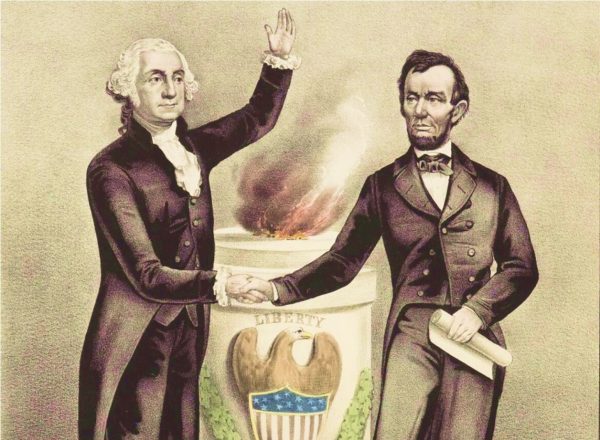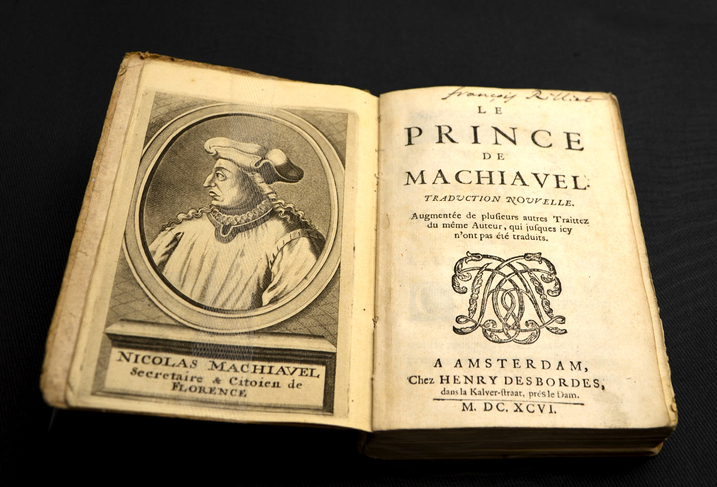The host of the Rubin Report talks about leaving the Left and forging his own path.
Natural Right Is Not a Narrative

As Harry Jaffa taught, political philosophy and justice are real.
Kenneth Kersch’s political universe is comprised of competing narratives and stories—“fighting faiths” as it were. His Conservatives and the Constitution (2019) follows the development of conservative narratives and stories since the second half of the 20th century when conservatives decided to make the Constitution and the founding their “fighting faith.”
Although Kersch attempts to maintain an academic neutrality between the “fighting faiths” of the conservative constitutionalists and the progressive liberals, he makes it clear that he doesn’t believe all “fighting faiths” are created equal. Conservatism and the Constitution is a tendentious and unnecessarily polemical work masquerading as a scholarly treatise. His animus against conservative constitutionalism is palpable.
Kersch’s ultimate fear is that the Supreme Court will be dominated by “the constitutionalist American Right” hewing to “Federalist Society scripts” and the “deep stories” told by “conservative Roman Catholics, Evangelical and Fundamentalist Christians, [and] Straussians.” Kersch makes abundantly clear that “the nation’s political constitutional trajectory” created by the constitutionalist right and abetted by the “Trump Gambit,” is now on the verge of transforming itself from an ideological movement into a legal doctrine, and its ultimate goal is to repeal Roe v. Wade, the Holy Grail of progressive liberalism. (Senator Chuck Schumer’s recent threat against Justices Gorsuch and Kavanaugh is only the most recent instance of the Church of Progressive Liberalism’s frantic defense of their sacred relic.)
If you are wondering how “Straussians” were included in this list on “the constitutionalist right,” you are not alone. It turns out that the Straussian narrative is much like orthodox, conservative Catholicism—it even has a schism between East and West. The “core conviction of Straussians,” Kersch informs us, is the belief that a “transcendent Truth is out there” that can be discovered by “disciplined and well-trained mind[s]” from classical works of ancient political philosophy, Biblical revelation, or a combination of the two.
This led the school of Strauss to wage war against historicism, relativism, and secularism, the enemies of “eternal, unchanging ‘human nature,’ authority, sanctity, and piety.” Citing William James, Kersch concludes that the Straussian movement is “essentially religious.” The worship of wisdom, whether derived from Athens or Jerusalem, generated “a fixation on heresy, corruption, decline, with a healthy dose of panic over the possibility of contamination.”
Never has such an inaccurate caricature of Strauss and the so-called Straussians been foisted on unsuspecting readers.
The Real Strauss
Leo Strauss wrote that the unresolved conflict between reason and revelation, between the arguments advanced on behalf of the philosophic point of view by philosophers and by theologians on behalf of the biblical point of view, “is the secret of the vitality of Western civilization.” It is impossible for reason, Strauss argued, to disprove the possibility of revelation and for revelation to deny the possibility of reason. In political terms the resolution would either be a theological or atheist tyranny, both of which have been prominent in the modern world.
Political freedom—indeed Western civilization—depends on whether the conflict or creative tension between reason and revelation can be kept alive. Strauss’s effort was to support the vitality of both reason and revelation, believing that a kind of dialectic between reason and revelation was necessary to the survival of the West. He revealed that the dominating purpose of his career was the attempt to understand this theological-political predicament.
Strauss realized that modern philosophy, beginning with Machiavelli, was an explicit attack on the authority of both reason and revelation. Ancient philosophy was denounced as utopian, posing goals that were impossible to attain. Christianity was similarly denounced as destroying political life by making the goods of the transcendent City of God preferable to the political goods of this world. Machiavelli and his epigones were eager to lower the goals of political life to render them attainable. The goods of this world would be immediately accessible, and the imaginary goods of the world to come could be exchanged for the real good of this world—the promise of eternal life in the next world be translated into security for life in this world.
Everyone shared the passion for self-preservation in this world; this was not the conclusion of reason, it was the strongest human appetite. Reason could be made to serve self-preservation in this world where necessity, not God or Nature, was the underlying reality. What order existed in the world would be created by man, and man, not God, would become the center of the Universe.
What the ancients called “nature” was indistinguishable from chance or merely accident. Man was responsible for his own fate; nature or natural right was not the standard of human or political excellence—nature was to be conquered to serve man’s purposes. God created an imperfect world of necessity—man can replace the imperfect creation of God with one designed, as Bacon proscribed, for the relief of man’s estate. Science will be the means. It will gratify man’s deepest and strongest longing for self-preservation—or, in Hobbes’s formulation, relief from the all-consuming fear of violent death.
The Limits of Modern Reason
But science, of course, cannot address the most important human and political questions—what is the good? What is justice? What is the best regime?—those questions that animated classical political philosophy. These became known as value questions and were said to be beyond the competence of science which rested on the fact-value distinction, a distinction that was crucial to the progress of science. Its power over nature—its conquest of nature—would not have occurred without the distinction.
Mathematical physics, the heart of modern science, would not have developed without the fact-value distinction. But modern science without a ground in morality inevitably led to complications of great magnitude. It was truly a bargain with the devil. It eventually led to what Strauss called “the self-destruction of reason.”
Authoritative opinion today holds that reason can tell us nothing about value questions; reason cannot decide between competing values or competing value systems because modernity has led us to believe that reason itself is merely the epiphenomenon of sub-rational forces, either one irrational passion or another, or race, ethnicity, sex, or a host of other irrational factors. This is the real reason that Kersch can offer us nothing real about politics—nothing about justice or morality—only narratives or stories. I suspect that Aristotle was right after all when he said that it is justice which preserves regimes.
Leo Strauss rarely wrote about American politics or about the American Constitution, but he did contend that constitutional or liberal democracy comes closer to the best regime of the classics than anything possible in the modern world. I do not believe that, despite the best efforts of modernity, Strauss thought that the possibility of classic natural right was destroyed by Machiavelli’s new modes and orders.
If it is true, as Aristotle remarked in the first book of the Politics, that man is by nature a political animal, then natural right—or at least its potential—is intrinsic to all political life. The manner in which it comes to light in any particular regime will depend upon actual political circumstances. In the Nicomachean Ethics Aristotle argues that natural right is a part of political right. And while natural right everywhere has the same force or power, it is everywhere changeable; it will manifest differently according to different political circumstances.
Political right is a combination of conventional and natural right, and “enlightened statesmen,” if any are present, will push as far as possible in the direction of natural right within the constraints of conventional right. Prudence or practical wisdom is the virtue that rules the world of politics and indeed the world of human things as such.
Equality and Nature
Whether modernity killed the possibility of natural right and thereby the virtue of prudence was the question which caused the great schism among the followers of Strauss, which resulted in what Kersch identifies as East Coast Straussians and West Coast Straussians.
East Coasters, led by Harvey Mansfield and the late Allan Bloom, believe that modernity succeeded in destroying natural right. In post-Machiavellian regimes, natural rights had decayed into a “low but solid” substitute for natural right. Self-preservation, not virtue, would henceforth be the object of government—or in the case of Locke, property and the emancipation of acquisition. The distinction between ancients and moderns was for the East an eidetic bridge that could never be crossed, and those who believed it could were simply uninitiated in the mysteries of esotericism.
The leader of the West Coast Straussians, Harry V. Jaffa, once accepted this view of the American Founding, criticizing its radically modern Lockean origins. Jaffa credited Lincoln’s refounding of America with introducing prudential Aristotelian elements into the regime. He changed his mind, however, when he discovered that those Aristotelian elements were already in the Founding and that Lincoln had discovered them there.
The discovery that led Jaffa to this conclusion was twofold.
First, the Founders did not read Locke with the care and precision of Strauss, who found a radical modern teaching buried deep within his esoteric writings; instead they read the exoteric Locke as practically wise statesmen, unmindful of any distinction between ancients and moderns, understanding Locke as the modern exponent of a prudential Aristotelian doctrine. As Strauss himself remarks, the exoteric Locke presents an “unbroken tradition of perfect respectability that stretches from Socrates to Locke.”
Second, Jaffa reevaluated his analysis of Aristotelian natural right, concluding that for Aristotle, prudence and natural right were one and the same. Since natural right was a part of political right and was everywhere changeable even though it everywhere had the same force or power, it followed that prudence or practical wisdom—the political virtue par excellence—must be the same, if not identical, with natural right.
“The prudence of the Declaration is the prudence of Aristotle and Lincoln because there are not two kinds of prudence,” Jaffa wrote:
While the manifestations of prudence are as many as the circumstances in which prudent action is possible, the virtue itself remains one and the same. This is why regarding Aristotle and Locke as representing opposing and contradictory philosophic doctrines is mistaken. The assumption that there is such a difference is the nerve of the difference between Eastern and Western Straussians.
Kersch identifies the West Coasters as the “moralist Straussians” and Jaffa’s constitutionalism as “redemptive” in its religious zeal. But Jaffa, of course, argued that the central principle of the Declaration that “all men are created equal” was an expression of natural right as well as divine right—reason and revelation. It was an act of enlightened statesmanship or prudence.
The East Coast Straussians criticize Jaffa for the importance he places on the principle of equality. They often cite Tocqueville to claim that once equality is invoked it will be preferred to liberty. (Tocqueville actually observed that Americans, like others in democratic ages, prefer liberty but cherish equality.) The East uses Tocqueville to argue that equality and liberty are incompatible.
Jaffa and the Founders instead maintained that natural human equality was the ground for liberty, and that without a recognition of equality there would be no basis for liberty, no argument against despotism, tyranny, divine right of kings or slavery—in short, no argument to support constitutional government based on the consent of the governed. Equality and consent of the governed are, in truth, reciprocal terms.
The Real Jaffa
Kersch is simply mean-spirited when he argues (falsely) that for Jaffa equality is merely the first premise of a logical argument for natural rights that happens to support emancipation but shows no regard for the fate of slaves or the civil rights of blacks, thus accomplishing only what he terms “virtual emancipation,” implying that “virtual emancipation” is not “real emancipation.” Only in the universe of narratives and stories can such legerdemain even be proposed!
Kersch seems to have no real knowledge of Jaffa’s works, although he had the good sense to rely on Charles Kesler’s early essay for much of his information. But Kersch seems not to have studied Jaffa’s extensive work on original intent or his many essays on constitutional subjects, especially his essays criticizing Chief Justice Rehnquist, Justice Scalia, Attorney General Meese and a host of other conservative luminaries. Kersch also doesn’t seem to realize that the many debates and exchanges between East and West have not been sectarian war in the Church of Strauss, but serious debates concerning serious issues in political philosophy that cannot be described by narratives or stories.
In any case, a book on conservative constitutionalism seems oddly outdated, although it might satisfy some historical curiosity. We have already reached the stage where the serious debate is between constitutionalism and post-constitutionalism. We are told by some of the most advanced constitutional scholars that the Constitution has been replaced by the administrative state and that administration has replaced constitutional law and politics.
If constitutional democracy is the regime that most closely approximates the best regime of classical political philosophy, the American Founding, as Jaffa suggests, was an example of prudent Aristotelian natural right. If, as our leading constitutionalists suggest—with some plausibility—we have entered a post-constitutional era, then the American Founding has been defeated by the forces of modernity and overwhelmed by relativism, historicism, and nihilism. Redemption or return seems unlikely, although in the course of human events, not impossible. Perhaps all we can do is pray for the return of the gods. Which gods, you may ask?
The American Mind presents a range of perspectives. Views are writers’ own and do not necessarily represent those of The Claremont Institute.
The American Mind is a publication of the Claremont Institute, a non-profit 501(c)(3) organization, dedicated to restoring the principles of the American Founding to their rightful, preeminent authority in our national life. Interested in supporting our work? Gifts to the Claremont Institute are tax-deductible.
We must recover the spirit of freedom.
Conservatives need to be a lot savvier about how they vet judicial candidates.
One dose will erase your whole political mind.
A reply to Chris Caldwell.
Or, How to (Posthumously) Conquer the World from Your Desk






